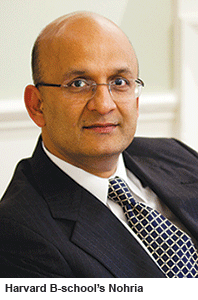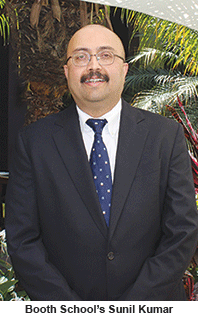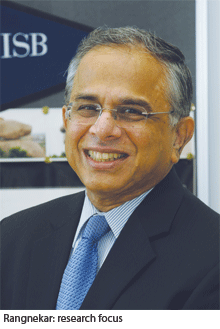 The pivotal persona who plays a vital role in shaping the character and brand of a B-school is the Dean of the institute, designated Director in India’s Central government-promoted 13 Indian Institutes of Management (IIMs). The essential qualifications of Dean/Director in all B-schools worldwide are excellent higher education, experience as faculty with administrative responsibilities in nationally and/or internationally respected business management education institutes, and demonstrated ability and life skills to manage learned academics with big reputations and egos to match.
The pivotal persona who plays a vital role in shaping the character and brand of a B-school is the Dean of the institute, designated Director in India’s Central government-promoted 13 Indian Institutes of Management (IIMs). The essential qualifications of Dean/Director in all B-schools worldwide are excellent higher education, experience as faculty with administrative responsibilities in nationally and/or internationally respected business management education institutes, and demonstrated ability and life skills to manage learned academics with big reputations and egos to match.
The great majority of Directors of India’s 13 IIMs — especially of the three globally ranked ABC (Ahmedabad, Bangalore and Calcutta) IIMs — fulfil these demanding criteria. But despite the IIMs having succeeded in attracting highly eminent academics, including several from top-ranked B-schools in the US and Europe, it’s patently clear they neither enjoy the fabulous pay and perquisites, nor the official and social respect of their counterparts abroad. Because IIMs are promoted and funded by the Union government, their Directors have always had to genuflect, if not quite kowtow, before relatively ignorant joint secretary-level bureaucrats of the Union human resource development (HRD) ministry. Now under the new IIM Bill 2015, the already modest powers conferred upon the Boards of Governors (BoGs) and Directors by the several IIM Acts (enacted separately for each institute) are proposed to be circumscribed further.
In sharp contrast, the powers exercised by the Deans of the world’s most prestigious B-schools are extensive. Although invariably privately promoted and managed institutions, their trustees and BoGs have the good sense to choose their Deans/Directors carefully and invest them with full powers subject to liberal superintendence by BoGs. “Historically, Harvard  University has adopted an approach it calls ‘every tub has its own bottom’ giving the several schools and departments within the university significant autonomy in many types of decision-making. Our current president Dr. Drew Gilpin Faust has sought to honour the philosophy but at the same time, encourage the synergy and leverage that can happen only when we act in a more co-ordinated fashion and remember that we are all part of a great university — what she calls One Harvard… However we have complete freedom around what I call the faculty’s intellectual and work output — the curriculum and research. There is no involvement, much less oversight, from the university as we enhance or modify the curriculum,” says Nitin Nohria, an alum of IIT Bombay and MIT Sloan School of Management, and incumbent dean of the top-ranked Harvard Business School (estb. 1908).
University has adopted an approach it calls ‘every tub has its own bottom’ giving the several schools and departments within the university significant autonomy in many types of decision-making. Our current president Dr. Drew Gilpin Faust has sought to honour the philosophy but at the same time, encourage the synergy and leverage that can happen only when we act in a more co-ordinated fashion and remember that we are all part of a great university — what she calls One Harvard… However we have complete freedom around what I call the faculty’s intellectual and work output — the curriculum and research. There is no involvement, much less oversight, from the university as we enhance or modify the curriculum,” says Nitin Nohria, an alum of IIT Bombay and MIT Sloan School of Management, and incumbent dean of the top-ranked Harvard Business School (estb. 1908).
“The freedom to choose research areas, curriculum and the ability to hire, promote and compensate faculty, subject to oversight of the Board of Trustees, is the essence of institutional autonomy. By statute, at the University of Chicago, the syllabus of the Booth School is formulated by the faculty and the curriculum is developed by the faculty and implemented in conjunction with the Dean’s office. Admission decisions are left to the Dean’s office and the Board of Trustees of the parent University of Chicago approves  tuition fees and fundraising for the Booth School,” says Bangalore-born Dr. Sunil Kumar, an engineering alumnus of IISc, Bangalore and ECE, Illinois who is the incumbent Dean of Chicago University’s highly-respected Booth School of Business (estb. 1898).
tuition fees and fundraising for the Booth School,” says Bangalore-born Dr. Sunil Kumar, an engineering alumnus of IISc, Bangalore and ECE, Illinois who is the incumbent Dean of Chicago University’s highly-respected Booth School of Business (estb. 1898).
Even in the state-of-the-art Indian School of Business, Hyderabad established in 2001 by some of the biggest names of India Inc, the Dean enjoys wide powers of administration and institution and academic development. For instance, the syllabus/curriculum is formulated by a Curriculum Review Committee selected by the Dean. “The committee is entirely formed by the Dean from among the faculty. The committee’s recommendations are discussed and approved by the ISB faculty and the Board is informed of changes planned only as a matter of information. Moreover, admission criteria are solely decided by the school and needs no board approval. Student fees are, however, approved by the board. Only tenured faculty appointments go to the board because they involve permanent commitments. All other faculty appointments need the Dean’s approval. The overall budget is of course approved by the board,” says Ajit Rangnekar, an engineering and management alum of IIT-Bombay and IIM-Ahmedabad who was appointed Dean of ISB in 2010.
Evidently the minister and control-and-command bureaucrats of the Union HRD ministry need to learn how the world’s best B-schools are managed in simultaneously loose-tight style.